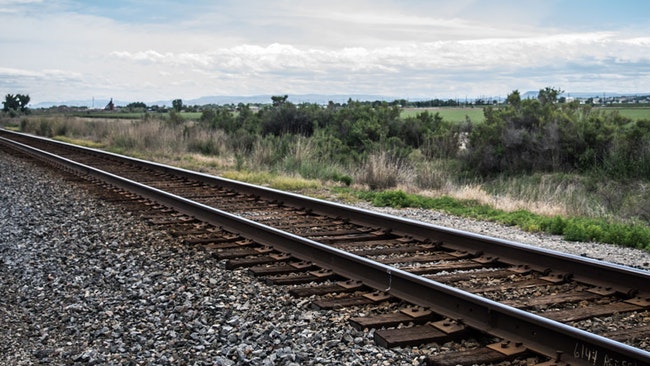
Hopes of a rail center north of Nyssa will attract commodities from across the Northwest will depend on fast rail service, according to some agriculture executives and producers in Washington. (The Enterprise/Kezia Setyawan)
NYSSA – Supporters of a rail reload center in Nyssa believe the closure of a major rail facility in eastern Washington could attract more business.
However, some producers and agriculture executives in the region say they aren’t interested unless the Nyssa development can offer expedited rail service.
In May, Union Pacific Railroad shuttered its specialty rail shipping facility in Wallula, Washington. The facility, southeast of the Tri-Cities and 230 miles from Nyssa, specialized in direct train shipments of commodities to the east, cutting days off normal train service.
“With COVID-19 impacting volume and truck prices, it is no longer sustainable to continue operations,” wrote Kristen South, Union Pacific senior director of corporate communications.
The decision by the railroad to pull the plug on its Wallula center kindled speculation among members of the Malheur County Development Corp. – the nonprofit established by the county to oversee the Nyssa rail facility – that producers and shippers in eastern Washington would shift their business to Malheur County.
“I could really see in the future a connection between the Columbia Basin and the Treasure Valley in which they do short haul, both rail and truck, to Nyssa and use Nyssa as a major reloading site for those two large valleys,” said Greg Smith, director of the Malheur County Economic Development Department.
He addressed the development board last month on the matter.
“I think it is pretty much across the board of people who are looking at this positively from our area,” said Grant Kitamura, president of the development corporation during the same meeting.
For at least some producers in eastern Washington, though, the key component to any rail facility is fast service and right now the Nyssa center – slated to come on line in two years – doesn’t offer such a benefit.
While Union Pacific pledged in 2019 to provide service to the Nyssa rail facility, it couldn’t guarantee to ship onions at peak times and to reach all destinations and offered its basic rail service, not its express package.
Lack of fast service at the Nyssa facility is a challenge for many agriculture producers and shippers, said Shawn Hartley, owner of Onions 52, a Utah-based firm that markets onions from eastern Washington.
“If it is not going to be any faster than a regular train, I don’t know anybody who will use it. If they can’t get this thing with expedited service I don’t know what the point is,” said Hartley. However, Hartley said if the Nyssa facility could offer expedited service “I think there would be a lot of interest in the Northwest.”
“There are a lot of unknowns (with the Nyssa facility) like where is it going to? How many times is the product going to be touched?” he said.
Jason Walker, general manager of Bybee Produce, a Prosser Washington onion shipping firm, said regular train service from any rail facility isn’t ideal.
“We are shipping a perishable product and we want it to arrive as fast as possible. There is no value to us to put it on a regular train of any kind unless it is expedited,” said Walker.
Mason Garrison, sales manager for Easterday Farms in eastern Washington, said shifting his firm’s onion shipping business south to Nyssa in the wake of the closure of the Wallula facility “doesn’t make any sense for us.”
“It is quite a drive. It would require us to direct trucks two ways. We don’t feel it is something that will be useful for us to be honest,” said Garrison.
Easterday Farms operates onion sheds in Pasco and Othello, Washington.
The chances of other commodities – such as apples and potatoes – going through the Nyssa facility aren’t promising either.
Tim Kovis, communications manager of the Washington State Tree Fruit Association, said for Washington apple producers, the Wallula facility wasn’t a major transportation source.
“So, it would be how it all pencils out and what the reliability would look like. Our members didn’t use a facility that was closer so I don’t know if we’d have members from central and northern Washington doing that,” said Kovis.
Chris Voigt, executive director of the Washington Potato Commission, said whether potato producers would use the Nyssa facility with just regular rail service is a “good question.”
“My concern would be is there enough business being in the Nyssa area?” said Voigt.
For Hartley, Garrison and Kovis the loss of Wallula rail shipping center wasn’t a business game-changer.
“We didn’t use it as much as our customers did,” said Hartley.
Garrison said Bybee Produce wasn’t a big customer at Wallula either.
“Maybe sent seven or eight loads a week. And that is something we can do via truck for the time being,” said Garrison
Kovis said the loss of the Wallula “doesn’t have a big effect on apples.”
“For the most part, apples are shipped by truck due to reliability,” said Kovis.
The closure of the Wallula center will have one immediate impact, said Walker.
“There is going to be more competition for trucks up in the Northwest, not just in our area. Whether it is apples or potatoes or frozen French fries, there is going to be more competition,” said Walker.
Kitamura said he believes Union Pacific may decide to offer expedited service at the Nyssa facility.
“If they want any kind of volume, they will have to do it,” said Kitamura. “If they know they will get business, they may do it.”
Kitamura said the development corporation is negotiating with an operator – identified in state documents as AmeriCold Logistics LLC – that may influence Union Pacific to provide expedited service in Nyssa.
“They are a big player so they have influence,” said Kitamura.
Patrick Reay, executive director of the Port of Walla Walla, said he doesn’t believe the Wallula rail center will be idle for long. The port owns the rail lines at Wallula.
“Union Pacific getting out of the business doesn’t mean there still isn’t rail access. This facility will be back on the market and will get picked up,” said Reay.
Reay said there is a need for “some sort of regular fresh produce freight mode” from the region.
“But it is a challenge to make it work. The shipping dynamics, availability and pricing – it is a very volatile business to be in,” said Reay.
The Nyssa rail reload center plan is touted as a major economic boost for the county where onions will be trucked in and loaded onto trains for shipment across the country. For the better part of three years, local officials and lawmakers have worked with the state to get the project off the ground but it faced delays, missed deadlines and criticism from some because of a perceived lack of transparency by the development corporation.
News tip? Contact reporter Pat Caldwell at [email protected].
SUBSCRIBE – $5 a month, automatically.
DONATE – to provide additional support. You can also mail a check: Malheur Enterprise, PO Box 310 Vale OR 97918. Donor identities are confidential unless the donor specifies otherwise. Thank you!




